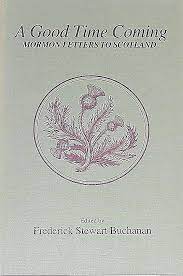Articles/Essays – Volume 23, No. 2
Tempering Memories | Frederick Stewart Buchanan, ed., A Good Time Coming: Mormon Letters to Scotland
The letters in this collection, ably edited and annotated, are neither literate nor consistently interesting. They lack informed perspective and only occasion ally throw any light on the larger questions of the times of which they are a part. Almost wholly absorbed with family or personal matters, the letters are relentlessly ordinary. Yet this is their value as historical documents and the source of their fascination.
The MacNeil-Thompson collection, from which this book has been fashioned, is housed in the archives of the University of St. Andrews in Scotland. It consists of letters sent home to Scotland from Utah, Arizona, and Illinois by members of the MacNeil-Thompson family and two of their friends. The letters tell of failure and heartbreak, of dreams never clearly articulated but unmistakably gone sour. They are a record of the bad times that memory often later suppresses or selectively edits when the “good times” come around. Sadly, the good times never did come around for this luckless family. Their history, frustratingly and elusively incomplete though it is, makes this book a necessary corrective to the cloyingly upbeat and deceptively positive histories of pioneer families with which we are all familiar.
The level of religious commitment of the various letter-writers is never very clear, perhaps because Scots tend to be reticent in such matters. Caution and realism shape their experience of Mor monism, which does not appear to be as central to their lives as their response to the doctrine of “gathering” might suggest. John MacNeil, easily the most interesting family member, is the only letter writer who displays any passion on the subject: “All they preach about hear is water ditches, field fences, canyon roads, cooperative Stores & Such like things” (pp. 105-6).
John MacNeil’s increasingly negative view of the Church—”Like all the rest of the Churches, its pay Money, pay Money, all the time &. don’t ask where it is going” (p. 184)—was matched by his resentment each time he lost a mining job to cheaper Chinese labor—”The Chinese is raising Hell with this Country. They work for a doller per day & Stands kicking & Cuffing around” (p. 184).
This combination of free thinking, resentment of job insecurity, a reluctance to acquire new job skills, and failure to adapt to the enterprising spirit of frontier Utah was, comments Buchanan, “a reason why he [MacNeil] never became truly integrated into Mormon society” (p. 106 n. 26). This judgment, which goes on to imply that MacNeil’s misery was largely of his own making, is probably correct although lacking in sympathy. John Mac Neil’s misfortunes were more than just the product of negative thinking.
In a Dickensian hell in Smithfield, Utah, MacNeil is appalled and humiliated while working in the home of a Sister Douglas, “a mean Curse of a woman” who makes him sleep on a child’s mattress on an unheated kitchen floor. “With cold i am froze nearly stiff. The question may suggest to you, why don’t she give you a larger mattress to lie on. She Says i must be like the indians (and) pull my knees up to my chin” (p. 108).
From the indignity of his first months in Utah, MacNeil stumbles through the remainder of his hapless life. Through a marriage to a widow sealed to another man, through the spiritual isolation of apostacy, all the way to his accidental —and, typically, uninsured— death in a mining accident, MacNeil is a victim. In his last years he is spared nothing, for his children are a source of despair. He wrote his sister, “I have Burried five of My Children and have five Left and am Sorry I didn’t burry them also. Theyr Not worth Owning” (p. 286).
The bleak sketches of the lives of most of the MacNeil-Thompson family suggest the difficulty of adapting foreign working-class attitudes to the aggressively middle-class environment that Mor monism created for itself. A few, such as the young James MacNeil who drowned while trying to save his expensive team of horses, seemed to have made that necessary adaptation. However, class values and mobility are topics with which most Americans are uncomfortable, and it is doubtful if they will ever be a productive sub-area of research in Mormon history.
Instead, A Good Time Coming deserves to be read and appreciated for preserving tempering memories from a time more commonly celebrated with tales of spiritual and material success.
The letters have been skillfully handled by Dr. Buchanan, and the footnotes are both useful and thoughtful. His prefatory remarks, covering Scottish Chartism and related topics as well as preliminary family information, are succinct and ger mane. The book, part of the Utah Centennial Series, has been handsomely produced.
A Good Time Coming: Mormon Letters to Scotland edited by Frederick Stewart Buchanan (Salt Lake City: University of Utah Press, 1988), x, 319 pp., $24.95. Foreword by Charles S. Peterson. Volume 4 in the Utah Centennial Series edited by Charles S. Peterson.


 Back to full Issue
Back to full Issue

